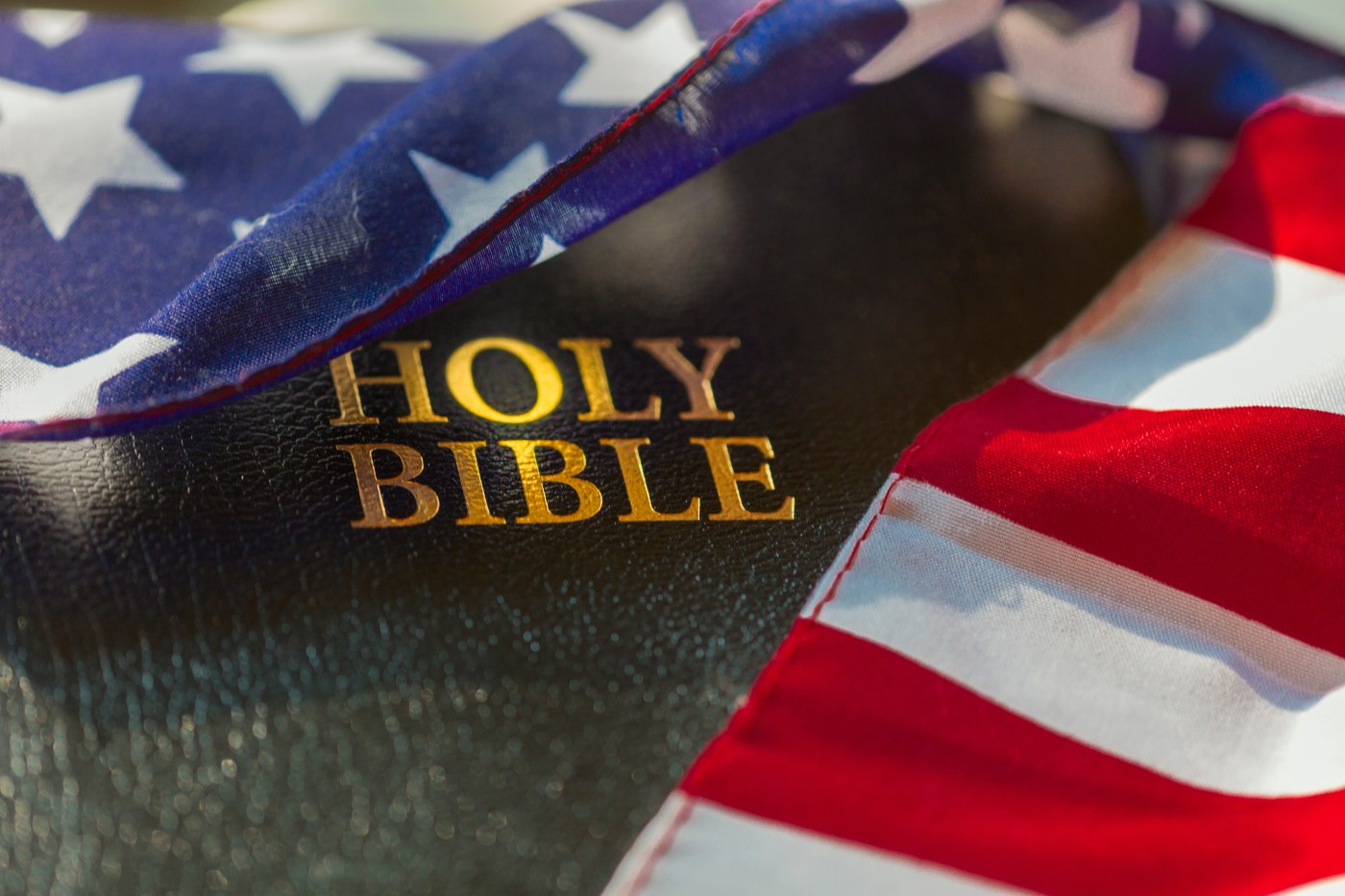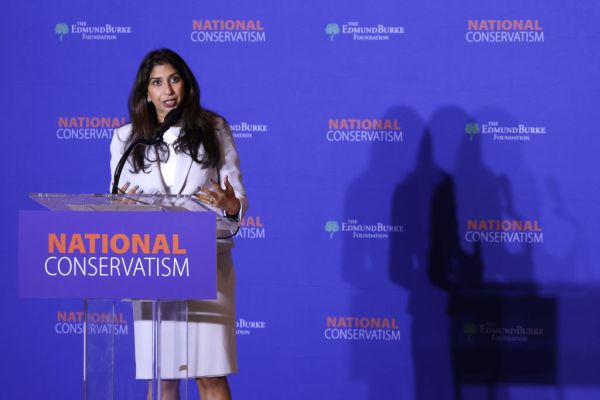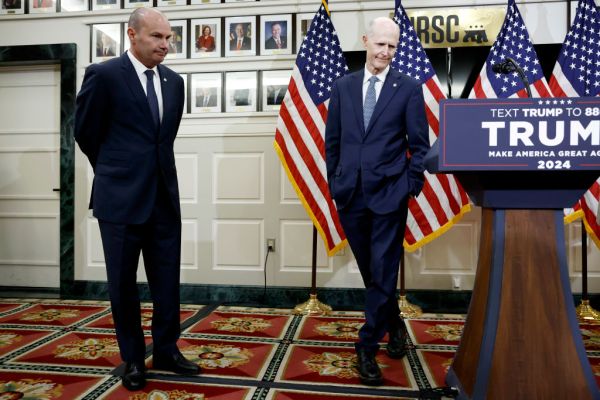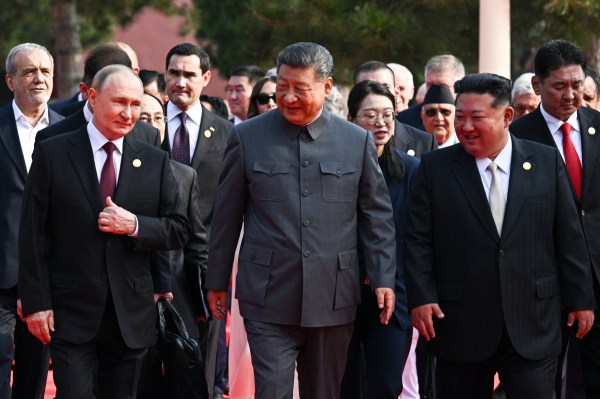Author’s Note: I’ve tried to get this piece out a couple of times, but the extraordinary events of the past few weeks have brought other news to the top of the heap. This report from NatCon4 covers events that happened a few weeks ago, but, as current affairs keep demonstrating, it is far from old news.
Earlier in the month, I attended NatCon4, the fourth annual meeting of the so-called national conservatives, a right-wing faction aligned with Donald Trump at home and with figures such as Viktor Orbán and Giorgia Meloni abroad. (Meloni would not enjoy being lumped in with Orbán, but I don’t draw the lines.) These would-be radicals and rightists would very much like the Republican Party to be something more like Marine Le Pen’s Rassemblement National or Geert Wilders’ Partij voor de Vrijheid, focused on questions of national identity. The worse sort identify strongly with Vladimir Putin, which you might assume would put you out of contention for high office as a Republican, but you’d be wrong if you did.
Unlike their British exemplar, Nigel Farage—who at least understands his own national traditions—the xenophobia of the so-called national conservatives in the United States is not limited to immigrants but extends also to economic contact with foreigners in the form of international trade and investment. For all their raging against the Left, this puts their economic views on free exchange and what we call, for lack of a better word, globalization roughly in line with those of the average Guardian columnist. They talk themselves into the preposterous belief that buying timber from Canada to build houses in the United States, for example, is evidence that the scheming transnational elites love money more than they love their countries, and that there is insufficient patriotism among the American nomenklatura, as tribune of the American plebs Sir Niall Ferguson calls them—instead of, you know, there being a lot of trees in Canada and a lot of demand for houses in the United States.
More than a few of these NatCons are profoundly stupid or willfully ignorant—don’t try explaining the difference between a trade deficit and a fiscal deficit to this crowd, or the fact that the Social Security “trust fund” is a figure of speech—but mostly what they are is angry and insecure. The people in the audience are angry and insecure, at least. The ones up on the stage are, in no small part, what they accuse the hated American “elites” of being: canny and amoral entrepreneurs willing to sell the authentic long-term interests of their country and their countrymen for prices that are surprisingly low. You see a lot of retreads from the old conservative circuit at NatCon, talking about how Republicans and conservatives have been doing it wrong for all these years, which makes you wonder what they were doing when they were running conservative institutions or serving in government.
Sens. Rick Scott, Mike Lee, and Ron Johnson shared a stage in which they whined, essentially with a single voice, that somebody ought to do … something! As though they were not senators and, in Scott’s case, a former governor and contender for Senate leadership in the post-Mitch McConnell era. (You’re going to miss Cocaine Mitch when he is gone.) That panel was especially annoying, as one of the things you’ll hear if you are a conservative critic of Trump is that you are just one of those “elites” hoping for invitations to Washington dinner parties, doing nothing while Congress spends us into penury. The senators on that stage spoke very proudly of attending a series of dinner parties during which they discussed plans to achieve something they all wanted—raising the debt ceiling so that Congress has more headroom to spend us into penury. I hope the canapés were good.
(I get a lot of that “inside the Beltway” talk directed at me. In reality, I live safely distant from Washington, and the only Georgetown cocktail party I have attended in the past decade was Jonah Goldberg’s birthday party, which was a lot of fun, as I blurrily recall.)
The weird thing is that if you ask these knuckleheads what the hell it is they think they are doing, they’ll tell you—many of them will—that they’re doing all this because they are Christians.
About that, I have some thoughts.
As any halfway serious religiously minded person would have predicted, the combination of Christianity and nationalism has profoundly corrupting and trivializing effects on Christianity. The human being being human, he lives in a small world in the here and now, and whatever spheres of profundity he may meditate upon when the spiritual mood is upon him, most of his time and attention is taken up by the essential human things: competition for material necessities, sexual partners, and—of highest importance once the physical requirements have been satisfied—status.
Eternity feels really far away—although it isn’t, it is already here—whereas the coming election in November feels immediate and urgent. The need to make such contests feel even more immediate and more urgent is why we have all of these amoral entrepreneurs trying to convince your grandfather that this is the most important election in American history, that the choice is between restoration and ruination, etc. If your grandfather has a minute to stop and think and turns his eyes toward the eternal things, it is going to be a lot harder for the Heritage Foundation to take $500 from him with one of its gross, dumb, dishonest direct-mail “surveys.” Whatever you hear from the pious ladies and gentlemen on the NatCon stage—or at the RNC—the last thing they want is for these rubes to actually turn their eyes toward Heaven, lest they notice that God is not watching Fox News, but is watching them.
Whatever you hear from the pious ladies and gentlemen on the NatCon stage—or at the RNC—the last thing they want is for these rubes to actually turn their eyes toward Heaven, lest they notice that God is not watching Fox News, but is watching them.
As it stands, it is inevitable that among these professing Christians and avowed nationalists, the Christianity is subordinated to the nationalism.
Yoram Hazony, who is a big deal in this circle (but not such a big deal that they didn’t misspell his name on at least one sign), is, in my view, not much of a political writer, but he is even less of a theologian. (One might not expect an Israeli-American Jew to be entirely up to speed on the finest points of Reformed doctrine.) He hectored the assembled believers, telling the gathered representatives of however many of the 6,000-odd (some of them very odd) flavors of Protestantism that they should just get over their religious differences—and, indeed, that Catholics and Protestants should just get over their differences, in order to more efficiently serve the cause of nationalism. Ah, yes: Just get over it! Where was Yoram Hazony 500 years ago, when he might have done some good? Poor Martin Luther did not have anybody like Yoram Hazony to advise him.
Hazony is one of those great anti-elitist American nationalists who went to Princeton and is a dual citizen who lives in a different country when he is not lecturing Americans about their need for a stronger sense of national identity, so I suppose that his simpleminded abrasion of the differences between different Christian communions is of a piece with the rest of his output. Just get over it. Papacy or presbytery? Magisterium or sola scriptura? Augustine or Osteen?* Just get over it. Who cares?
Well, all of the schism and debate in the Christian world is predicated on the notion that Somebody cares, and that this matters. Not only does it matter, it matters a great deal. From the point of view of history—and from the point of view of a serious believer—the religious differences between Catholics and Protestants surely are of more consequence than the national differences between the Flemish and the Walloons or even between the French and the Belgians or the Germans and the Austrians. These questions involve not only the first things but also the final things. It doesn’t matter to Hazony et al. because, for them, Trump is the thing—this is pure idolatry.
But best for the rubes not to think too carefully about these things. Because there isn’t a lot of obvious support for such formulations as: “I take my Christianity very seriously; ergo, I must be an enthusiastic and uncritical supporter of Donald J. Trump.” Or: “I take my Christianity very seriously; ergo, f—k those immigrants.”
Set aside the obvious questions of what we might very charitably call “inconsistency,” as much fun as it is to meditate on the fact that the people who dream of prohibiting pornography are lined up behind the man who has literally appeared in pornographic films. Set aside even the character of Trump himself, a man who never has had a wife or a business partner he didn’t betray, whose troubles in New York originate in his having been obliged to pay hush money to a pornographic actress with whom he had a sad little hotel-room tryst while his third wife (an immigrant who very likely worked illegally) was at home nursing a baby. What morality asks of Donald Trump is one question, but the relevant one here is what Donald Trump demands of his adherents. The thou-shalt-not that should be top of mind here is not Trump’s adultery (or his idolatry, or his coveting, or his lying) but the Trump movement’s demand that its adherents bear false witness as a test of loyalty and condition for good standing.
That Trump recently was nicked by martyrdom makes it that much easier to sanctify the lies and the fraud and the adultery and the cruelty and the bulls—t.
Is there a single honest Trump apologist in America? I cannot think of one. There certainly weren’t any to be seen at the RNC. All of them bear false witness: about the 2020 election, about the origin of Trump’s legal troubles, about his business and political record, about his character, about his religious convictions, about Joe Biden, about the Democrats, about the state of the country, about Ukraine, about Russia. Trump is dishonest himself and a spur to dishonesty in others. Read Steve Hayes’ recent conversation with born-again bulls—t artist Mike Lee to get a taste of it.
Yoram Hazony can stand up there and declare that you cannot call yourself a conservative if you have any hesitation about public displays of the Ten Commandments. But can you call yourself a Christian—or, in Hazony’s case, an observant religious Jew—if you stand in front of those commandments and systematically violate them in the cause of political expedience?
“Woe unto them that call evil good, and good evil; that put darkness for light, and light for darkness; that put bitter for sweet, and sweet for bitter! … Which justify the wicked for reward, and take away the righteousness of the righteous from him.”
I am all for a more prominent role for religion and religious figures—especially clergymen and religious intellectuals—in public life. But I expect that to yield results rather different from the ones desired by the NatCon gang.
Correction, July 28, 2024: Updated to correctly spell Joel Osteen’s surname.







Please note that we at The Dispatch hold ourselves, our work, and our commenters to a higher standard than other places on the internet. We welcome comments that foster genuine debate or discussion—including comments critical of us or our work—but responses that include ad hominem attacks on fellow Dispatch members or are intended to stoke fear and anger may be moderated.
With your membership, you only have the ability to comment on The Morning Dispatch articles. Consider upgrading to join the conversation everywhere.